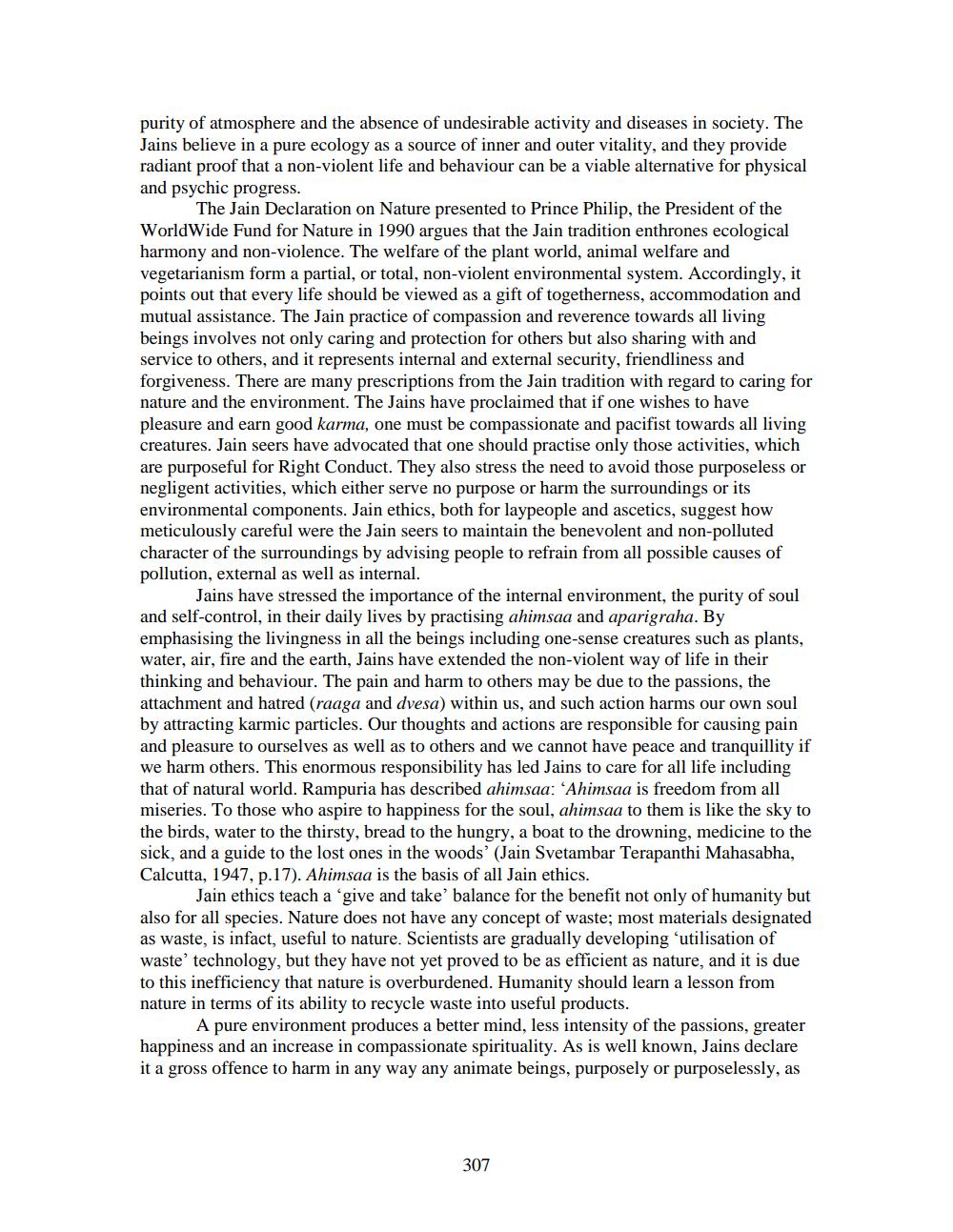________________
purity of atmosphere and the absence of undesirable activity and diseases in society. The Jains believe in a pure ecology as a source of inner and outer vitality, and they provide radiant proof that a non-violent life and behaviour can be a viable alternative for physical and psychic progress.
The Jain Declaration on Nature presented to Prince Philip, the President of the WorldWide Fund for Nature in 1990 argues that the Jain tradition enthrones ecological harmony and non-violence. The welfare of the plant world, animal welfare and vegetarianism form a partial, or total, non-violent environmental system. Accordingly, it points out that every life should be viewed as a gift of togetherness, accommodation and mutual assistance. The Jain practice of compassion and reverence towards all living beings involves not only caring and protection for others but also sharing with and service to others, and it represents internal and external security, friendliness and forgiveness. There are many prescriptions from the Jain tradition with regard to caring for nature and the environment. The Jains have proclaimed that if one wishes to have pleasure and earn good karma, one must be compassionate and pacifist towards all living creatures. Jain seers have advocated that one should practise only those activities, which are purposeful for Right Conduct. They also stress the need to avoid those purposeless or negligent activities, which either serve no purpose or harm the surroundings or its environmental components. Jain ethics, both for laypeople and ascetics, suggest how meticulously careful were the Jain seers to maintain the benevolent and non-polluted character of the surroundings by advising people to refrain from all possible causes of pollution, external as well as internal.
Jains have stressed the importance of the internal environment, the purity of soul and self-control, in their daily lives by practising ahimsaa and aparigraha. By emphasising the livingness in all the beings including one-sense creatures such as plants, water, air, fire and the earth, Jains have extended the non-violent way of life in their thinking and behaviour. The pain and harm to others may be due to the passions, the attachment and hatred (raaga and dvesa) within us, and such action harms our own soul by attracting karmic particles. Our thoughts and actions are responsible for causing pain and pleasure to ourselves as well as to others and we cannot have peace and tranquillity if we harm others. This enormous responsibility has led Jains to care for all life including that of natural world. Rampuria has described ahimsaa: "Ahimsaa is freedom from all miseries. To those who aspire to happiness for the soul, ahimsaa to them is like the sky to the birds, water to the thirsty, bread to the hungry, a boat to the drowning, medicine to the sick, and a guide to the lost ones in the woods' (Jain Svetambar Terapanthi Mahasabha, Calcutta, 1947, p.17). Ahimsaa is the basis of all Jain ethics.
Jain ethics teach a 'give and take' balance for the benefit not only of humanity but also for all species. Nature does not have any concept of waste; most materials designated as waste, is infact, useful to nature. Scientists are gradually developing 'utilisation of waste' technology, but they have not yet proved to be as efficient as nature, and it is due to this inefficiency that nature is overburdened. Humanity should learn a lesson from nature in terms of its ability to recycle waste into useful products.
A pure environment produces a better mind, less intensity of the passions, greater happiness and an increase in compassionate spirituality. As is well known, Jains declare it a gross offence to harm in any way any animate beings, purposely or purposelessly, as
307




